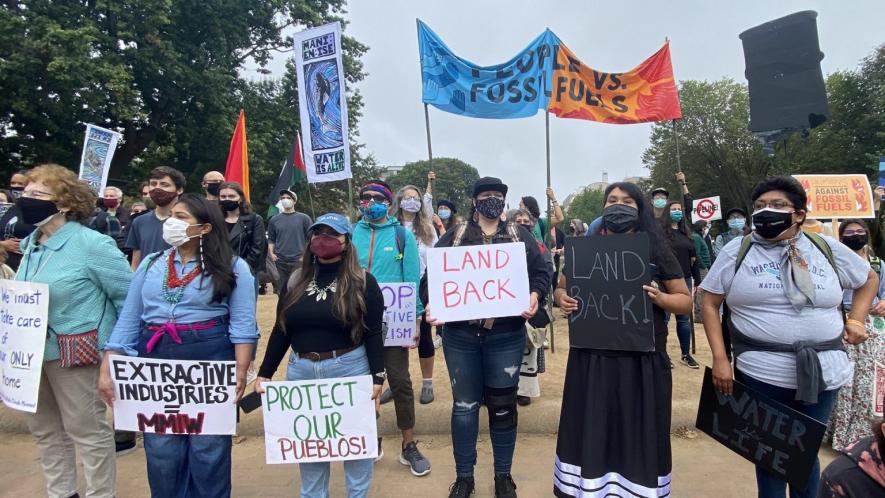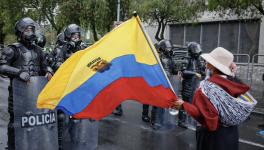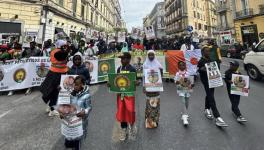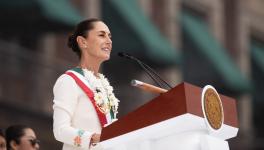US Observes First Official Indigenous Peoples’ Day

A demonstration held outside the White House in Washington DC, on the Indigenous Peoples’ Day, on October 11. Photo: Indigenous Environmental Network/Twitter
As the United States commemorates the Indigenous Peoples’ Day for the first time in history, Indigenous activists are demanding it to officially replace Columbus Day as a federal holiday. President Joe Biden had issued a proclamation on Friday, October 8, to observe Indigenous Peoples’ Day alongside the annual Columbus Day celebrations on the second Monday of October.
“I think it really recognizes that Indigenous people are still here,” said Alannah Hurley, executive director of United Tribes of Bristol Bay. “We just have been struggling for so long for the vast majority of mainstream America and culture to recognize that — that we are not just in history books.”
While the proclamation acknowledged the historical violence and discrimination inflicted on Indigenous groups and has been hailed by many as a symbolic step forward, many activists have found it to be falling short.
Biden had also stated that state and local governments are not required to observe Indigenous Peoples’ Day, and issued a separate proclamation on the same day, emphasizing that Columbus Day will continue to be a federal holiday.
Columbus Day commemorates the landing of the Spanish colonial conquest led by Italian voyager Christopher Columbus to the Americas on October 12, 1492. The day has been observed by the federal government since 1934, and became a federal holiday since 1971.
Although Columbus’ voyage and conquests were limited to the Caribbeans and mistook the modern-day Americas as the “Indies” (a medieval European conception of South and Southeast Asia), late-18th and 19th century myth-making and widespread historical revisionism of colonial histories and the foundation of the US, Columbus came to be commemorated as the man who “discovered” America.
The campaign for Columbus Day was supported by the large Italian-origin citizens of the US to push back against discriminatory policies against them. To this day, a large number of Italian-Americans commemorate Columbus Day as a celebration of their heritage, despite criticisms from both within and outside the community.
Even in his proclamation assuring the continuation of Columbus Day, Biden referred to the “millions of Italian Americans” who “continue to enrich our country’s traditions and culture and make lasting contributions to our Nation.”
Indigenous groups have argued that Columbus Day not only ignores but also seeks pride from the more than five centuries of ongoing colonization of European settlers and their descendants. The immediate impact of the first voyage by Columbus, was large-scale colonization of the Americas inhabited by native tribes and communities, brutal massacres and pillaging by Spanish forces.
Hundreds gathering outside the White House on Indigenous People’s Day to demand President Biden declare a climate emergency and stop approving fossil fuel projects that threaten communities and the climate. #PeopleVsFossilFuels pic.twitter.com/oC8d9OhrcU
— Jamie Henn (@jamieclimate) October 11, 2021
“For generations, Indigenous communities throughout the Americas have fought to survive colonization, assimilation, disease, and genocide,” said Jonathan Nez, president of the Navajo Nation, in a statement released earlier this month supporting a pending bill to replace Columbus Day. “Many of these same atrocities continue today, but the Native peoples of this land continue to be resilient, strong, and prosperous.”
“Recognition of Indigenous Peoples’ Day will help our future generations revel in their identities and promote the survival of our cultures, languages, and indigeneity,” added Nez
With the advent of other colonial powers and also foreign diseases from Europe, the colonization of the Americas also led to a massive decline in Indigenous populations across the continent. According to varying estimates among historians, the Indigenous population across the Americas could range between 50-100 million, by the late-15th century, largely concentrated around central and south America.
In the modern-day US, historical estimates of a pre-Columbian population range widely between 2 million to 18 million. Several historically recorded tribes and bands have been nearly completely exterminated due to displacement, massacres, colonial wars, and even induced epidemics of diseases alien to the tribes. By the turn of the 20th century the numbers had diminished to around a quarter of a million.
Since the 1970s anti-colonial and Indigenous groups, tribal authorities like the Navajo Nation and others, have pushed local and state legislations to commemorate Indigenous People’s Day, In 1989 South Dakota became the first state to officially recognize “Native American Day” replacing Columbus Day.
To date, over 130 cities and 21 states commemorate Indigenous People’s Day in some form or the other. Very few have taken the extra step of replacing Columbus Day with Indigenous People’s Day, often going for a compromise of commemorating both events on the same day, fearing backlash from conservatives and right-wing groups.
Even before official patronage was received, hundreds of locations across the US have been commemorating the Indigenous People’s Day, as a means to highlight both historical and ongoing crimes and oppression of native peoples.
At the same time activists continue to highlight the ongoing issues affecting Indigenous communities, including loss of land for mining and pipeline projects, continued attacks and violence on Native Americans, violation of treaty rights by different administrations, and the institutional discrimination faced by Indigenous persons, among other things.
A demonstration outside the presidential office, White House, in Washington DC, highlighted these issues. Dozens participated with many holding placards criticizing the Biden administration’s silence on several major mining projects. Dozens more came pouring in after law enforcement officers were reportedly deployed with sound canons to clear the demonstrators.
Across the way, we’re hearing our heroes receive warnings regarding arrest. @POTUS, what do you believe in? Is there more to you than your performative tactics? #PeopleVsFossilFuels pic.twitter.com/A8mcu04mLN
— Indigenous Environmental Network (@IENearth) October 12, 2021
Get the latest reports & analysis with people's perspective on Protests, movements & deep analytical videos, discussions of the current affairs in your Telegram app. Subscribe to NewsClick's Telegram channel & get Real-Time updates on stories, as they get published on our website.
























